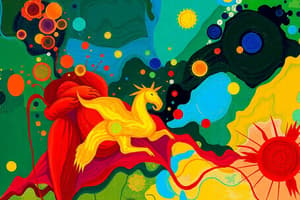Podcast
Questions and Answers
What is the process by which plants make their own food?
What is the process by which plants make their own food?
- Photosynthesis (correct)
- Respiration
- Digestion
- Gases
Atoms are always found in compounds.
Atoms are always found in compounds.
False (B)
The process of separating mixtures is known as _______________.
The process of separating mixtures is known as _______________.
separation of mixtures
What is the main function of teeth?
What is the main function of teeth?
Match the following concepts with their correct definitions:
Match the following concepts with their correct definitions:
Match the following concepts with their correct categories in biology:
Match the following concepts with their correct categories in biology:
Match the following chemical concepts with their correct descriptions:
Match the following chemical concepts with their correct descriptions:
Match the following chemistry concepts with their correct descriptions:
Match the following chemistry concepts with their correct descriptions:
Match the following biological concepts with their correct descriptions:
Match the following biological concepts with their correct descriptions:
Match the following scientific concepts with their correct descriptions:
Match the following scientific concepts with their correct descriptions:
Flashcards are hidden until you start studying
Study Notes
Water Cycle
- The water cycle involves the continuous movement of water on, above, and below the surface of the Earth
- It consists of evaporation, condensation, and precipitation
Photosynthesis
- Process by which green plants, algae, and some bacteria convert light energy into chemical energy
- Equation: 6CO2 + 6H2O + light energy → C6H12O6 (glucose) + 6O2
- Importance: produces oxygen, regulates Earth's climate, and supports life
Feeding Relationships
- Food chain: sequence of organisms that eat other organisms
- Food web: network of interconnected food chains
- Types of consumers: herbivores, omnivores, carnivores, decomposers
Atomic Structure
- Atom: smallest unit of matter
- Subatomic particles: protons, neutrons, electrons
- Electron configuration: arrangement of electrons in energy levels (shells)
Periodic Table
- Organizes elements by properties and recurring patterns
- Elements: substances consisting of atoms with the same number of protons
- Periods: horizontal rows; groups: vertical columns
Substances
- Pure substance: matter with a fixed composition
- Impure substance (mixture): blend of two or more substances with varying compositions
- Examples: air (mixture of gases), alloys (mixtures of metals)
Gases
- State of matter with neither shape nor volume
- Properties: compressibility, expandability, low density
- Behaviors: diffusion, effusion, gas laws (e.g., Boyle's Law)
Physical Change
- Alteration of a substance's state or phase without change in composition
- Examples: melting, freezing, boiling, condensation
Chemical Change
- Transformation of one substance into another with a change in composition
- Examples: rusting, combustion, photosynthesis
Nutrients and their Sources
- Macronutrients: carbohydrates, proteins, fats
- Micronutrients: vitamins, minerals
- Food sources: plants, animals, fungi, fortified products
Teeth Structure and Function
- Tooth composition: enamel, dentin, cementum, pulp
- Functions: biting, chewing, grinding, speaking
Digestion and Digestive System
- Mechanisms: mechanical breakdown, chemical digestion
- Organs: mouth, esophagus, stomach, small intestine, large intestine
Respiration
- Process by which cells generate energy from glucose
- Stages: glycolysis, pyruvate oxidation, citric acid cycle, electron transport chain
- Importance: energy production, CO2 regulation
Separation of Mixtures
- Methods: filtration, sedimentation, decantation, chromatography, distillation
- Applications: purification, recycling, chemical synthesis
Water Cycle
- The water cycle involves the continuous movement of water on, above, and below the surface of the Earth
- It consists of evaporation, condensation, and precipitation
Photosynthesis
- Process by which green plants, algae, and some bacteria convert light energy into chemical energy
- Equation: 6CO2 + 6H2O + light energy → C6H12O6 (glucose) + 6O2
- Importance: produces oxygen, regulates Earth's climate, and supports life
Feeding Relationships
- Food chain: sequence of organisms that eat other organisms
- Food web: network of interconnected food chains
- Types of consumers: herbivores, omnivores, carnivores, decomposers
Atomic Structure
- Atom: smallest unit of matter
- Subatomic particles: protons, neutrons, electrons
- Electron configuration: arrangement of electrons in energy levels (shells)
Periodic Table
- Organizes elements by properties and recurring patterns
- Elements: substances consisting of atoms with the same number of protons
- Periods: horizontal rows; groups: vertical columns
Substances
- Pure substance: matter with a fixed composition
- Impure substance (mixture): blend of two or more substances with varying compositions
- Examples: air (mixture of gases), alloys (mixtures of metals)
Gases
- State of matter with neither shape nor volume
- Properties: compressibility, expandability, low density
- Behaviors: diffusion, effusion, gas laws (e.g., Boyle's Law)
Physical Change
- Alteration of a substance's state or phase without change in composition
- Examples: melting, freezing, boiling, condensation
Chemical Change
- Transformation of one substance into another with a change in composition
- Examples: rusting, combustion, photosynthesis
Nutrients and their Sources
- Macronutrients: carbohydrates, proteins, fats
- Micronutrients: vitamins, minerals
- Food sources: plants, animals, fungi, fortified products
Teeth Structure and Function
- Tooth composition: enamel, dentin, cementum, pulp
- Functions: biting, chewing, grinding, speaking
Digestion and Digestive System
- Mechanisms: mechanical breakdown, chemical digestion
- Organs: mouth, esophagus, stomach, small intestine, large intestine
Respiration
- Process by which cells generate energy from glucose
- Stages: glycolysis, pyruvate oxidation, citric acid cycle, electron transport chain
- Importance: energy production, CO2 regulation
Separation of Mixtures
- Methods: filtration, sedimentation, decantation, chromatography, distillation
- Applications: purification, recycling, chemical synthesis
Studying That Suits You
Use AI to generate personalized quizzes and flashcards to suit your learning preferences.




